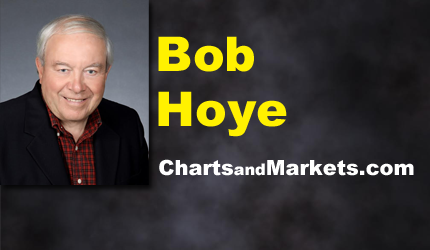June 30, 2023 | Interest Rates, Currencies, Mortgages, Gold

Bob Hoye has been in investment business for some 50 years, making him one of the more experienced researchers. His historical work has been thorough providing the first recognition of the fascinating transition from speculation in commodities to speculation in financial assets. It was controversial when Bob observed that “No matter how much the Fed prints, stocks will outperform commodities”. In January 2000, the research team concluded that the Dot-Com Bubble would peak in March 2000. In early 2007, the team outlined that the credit markets would reverse in May-June 2007. They did and the stock market followed. The latest was the call in early October for the Bitcoin Bubble to complete in December. Bob’s essays and speeches on political change and on actual climate change have been widely circulated.
Climate Change and Witches
Listen to Podcast:
STAY INFORMED! Receive our Weekly Recap of thought provoking articles, podcasts, and radio delivered to your inbox for FREE! Sign up here for the HoweStreet.com Weekly Recap.
Bob Hoye Archives June 30th, 2023
Posted In: HoweStreet.com Radio
Previous: « Until Something Breaks…
Next: Sober Time »












I’m responding to financial historian Bob Howe reference to events in the 1600’s and the rapid changes that are happening now. There is an important message there. I have an interested in early modern period as well. It is no exaggeration to say that there are social/political changes ie ‘novus ordo’ happening in the English-speaking world the likes of which have not been seen since the 16th century. Then there was a move from a hierarchical/traditional political system, to what one would loosely call ‘libertarian’ – favorable for commerce and trade (as explained by 19th century writer C.Mackay). Bob says that when this economy rolls over and excesses are wrung out another “great reformation“ could be coming. I believe it is an open question whether one will happen or whether it will be the one anticipated or wished for.
Going back to the 1600’s, English Catholics were hopeful that the accession of James VI who was after all the son of Mary queen of Scots would give them some relief. They would be sorely frustrated. The reimposition of sanctions by the English parliament led to the Catholic ‘gunpowder plot’ on the parliament, discovery of which would swiftly result in more repression. Roman Catholics would no longer be perceived going forward as just recalcitrant traditionalists but as dangerous radicals and subversives. That really closed the chapter for the traditional view in England.
Hi Bob and Jim. Marketwatch headline: ‘Something Just Snapped’: Consumers Panic Search “Pawn Shop Near Me”. Bob, I’m confused. The financial media has been reporting that consumers are still flush with covid money and fat credit lines and are spending like “drunken sailors”. Could “pawn shop” transactions actually be a leading economic indicator? Are the “drunken consumers” finally sobering up? Another question for Bob. After the Trudeau government in 2020 created 1 trillion in debt to fight the pandemic, President Trudeau said the following: “We made a very specific and deliberate choice throughout this pandemic to help Canadians…… We decided to take on that debt to prevent Canadians from having to do it. If the federal government hadn’t taken on significant debt in order to send money to Canadians, to support businesses and households.” Bob, I am even more confused. Doesn’t Canadian citizens have to service that debt through higher taxes and inflation?